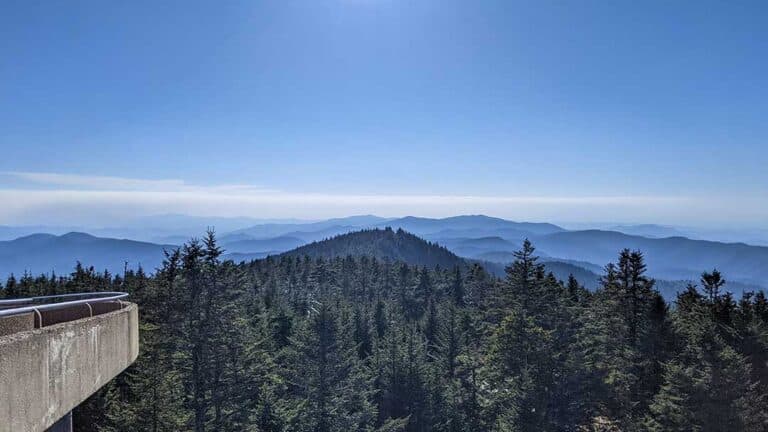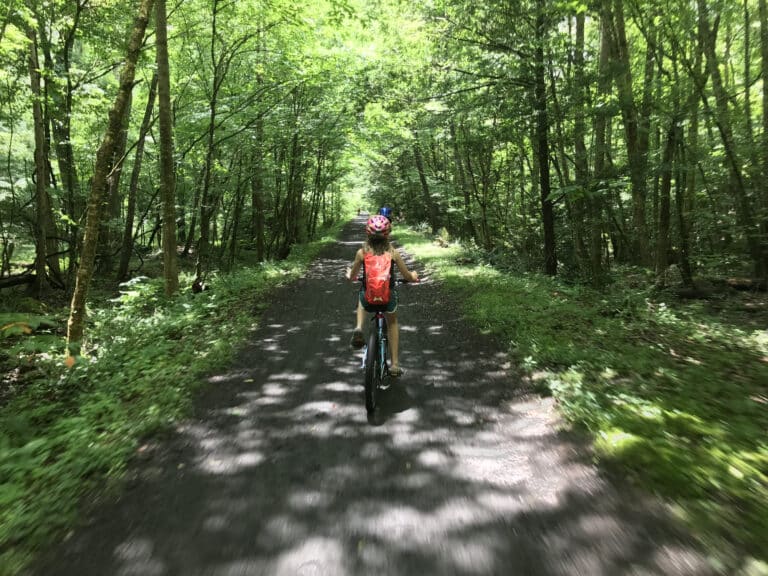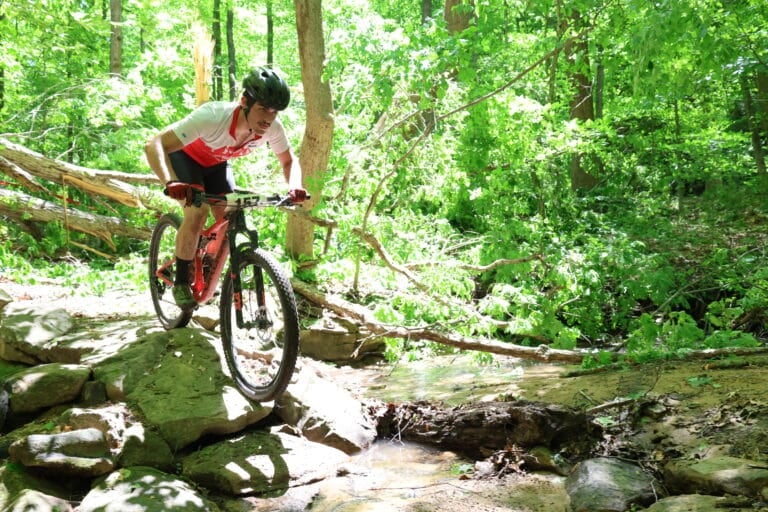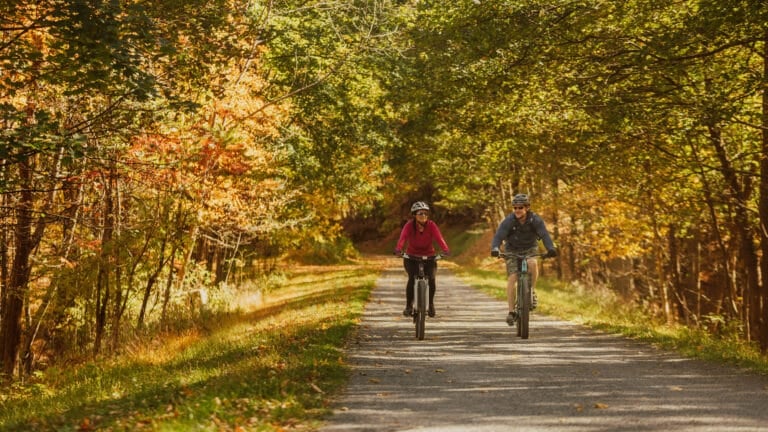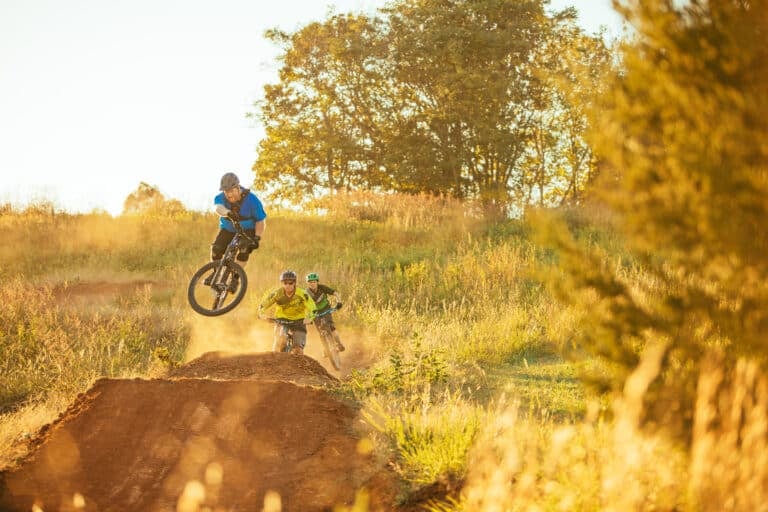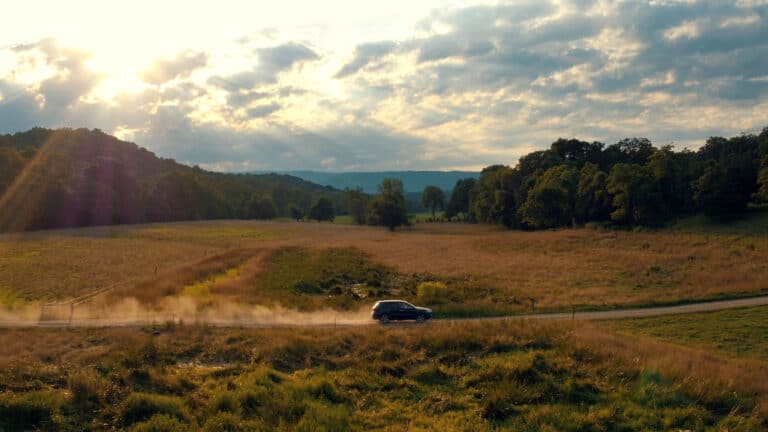How one North Carolina therapist is harnessing the power of mountain biking to help trauma survivors.
Cover: Forest bathing is about remembering we belong to the Earth. Photo courtesy of Conserving Carolina
It’s a Wednesday afternoon, and Sara Hunter is ripping down a ribbon of singletrack in North Carolina’s DuPont State Recreational Forest. As she rounds a corner, she shifts her weight low, floats over a tangle of roots and rocks, and lets out a gleeful yip.
To an outsider, this might look like a midweek joyride. But to Hunter—a licensed clinical mental health counselor and certified mountain bike instructor—it’s healing in motion.
“Most of the clients I work with experience a significant amount of stress and anxiety,” she says. “Having space to access joy and silliness on the bike brings a sense of relief they might not get to feel very often.”
Hunter is among a growing number of mental health professionals blending somatic work and nature-based experiences in a niche known as adventure therapy. At her Asheville-based practice, she works with clients both on the couch and in the saddle, guiding them down singletrack as they slowly rewire their brain’s neural pathways.
“We don’t talk about trauma over and over,” she says. “Instead, we process it somatically while learning how to regulate in the moment.”
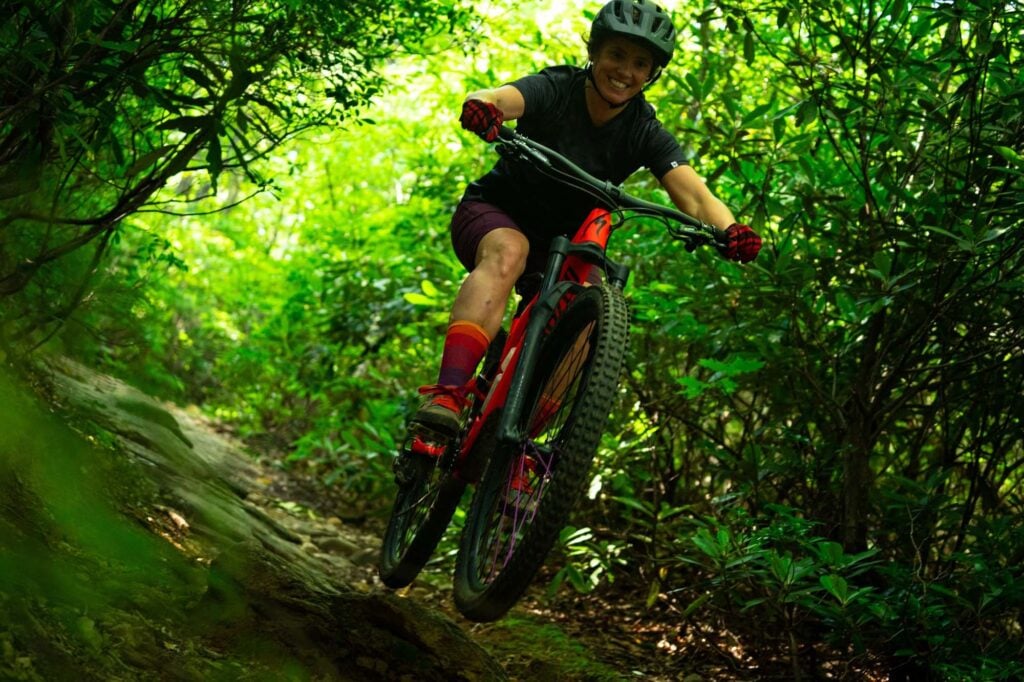
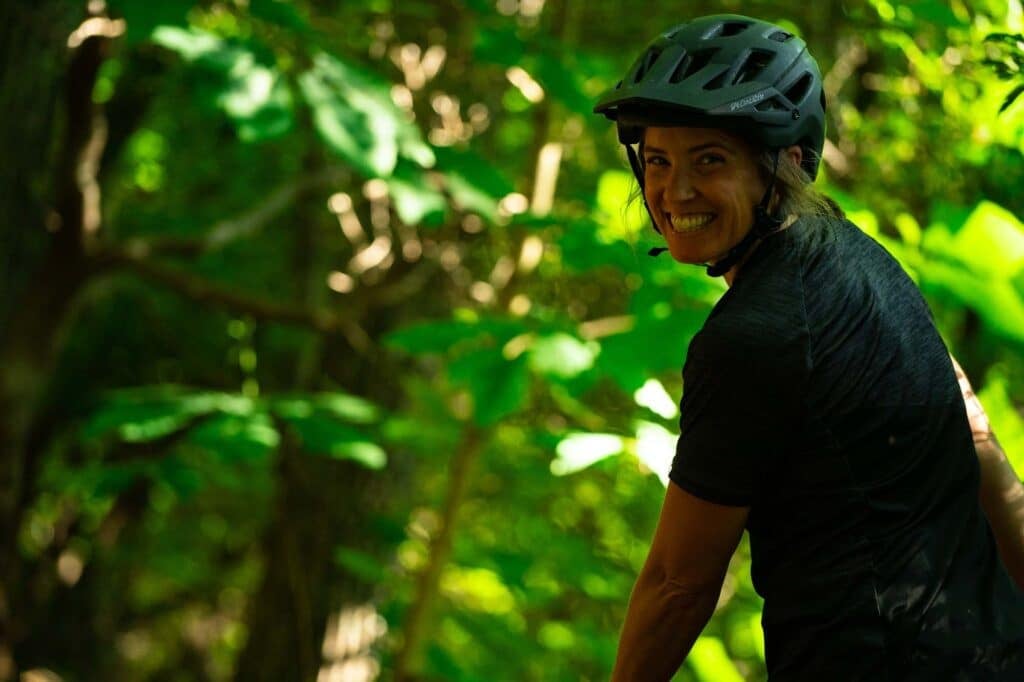
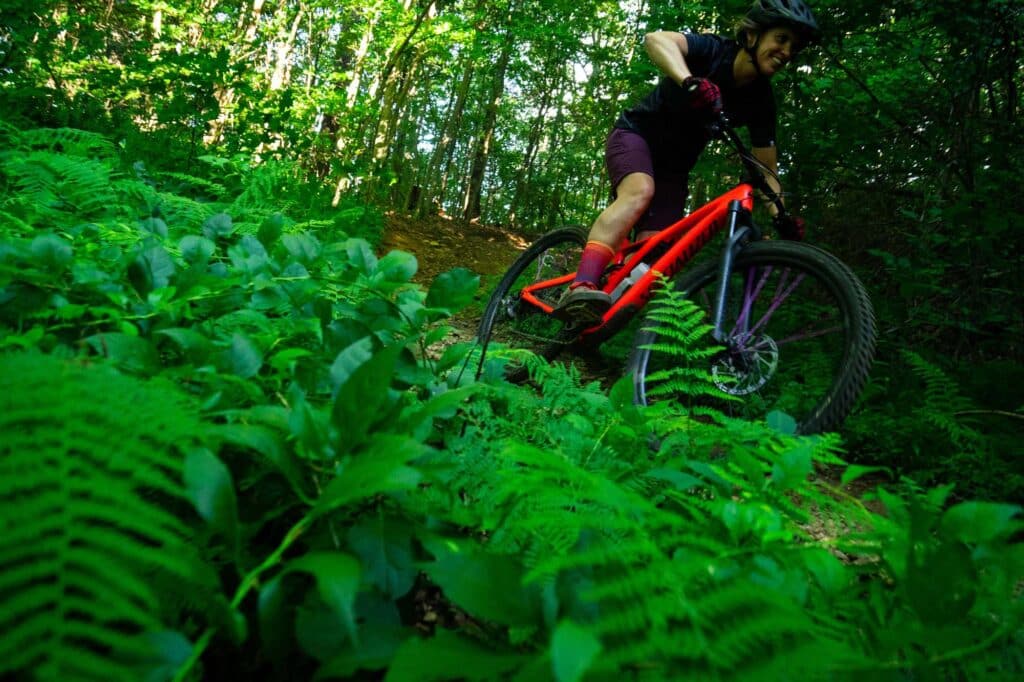
Hunter’s journey to adventure therapy began with a backpack and a compass. As a college student at UNC Wilmington, she enrolled in a 30-day National Outdoor Leadership School (NOLS) course in Wyoming’s Absaroka Wilderness. It pushed her well beyond her comfort zone.
“I was a pretty shy person and didn’t believe in myself all too much. It was hard for me to find internal worth,” Hunter says. “But through the NOLS course, I built so much confidence.”
Inspired, she became a NOLS instructor and began leading extended backpacking and climbing trips across the West. But what stuck with her most wasn’t the technical skill-building—it was the deep, human connection that emerged in the backcountry.
“I loved walking alongside people as they faced hard things,” she says, “whether it was the terrain or something they were carrying from home.”
In 2011, Hunter moved to Asheville and enrolled in Western Carolina University’s clinical mental health counseling program. Around that time, a friend encouraged her to try mountain biking.
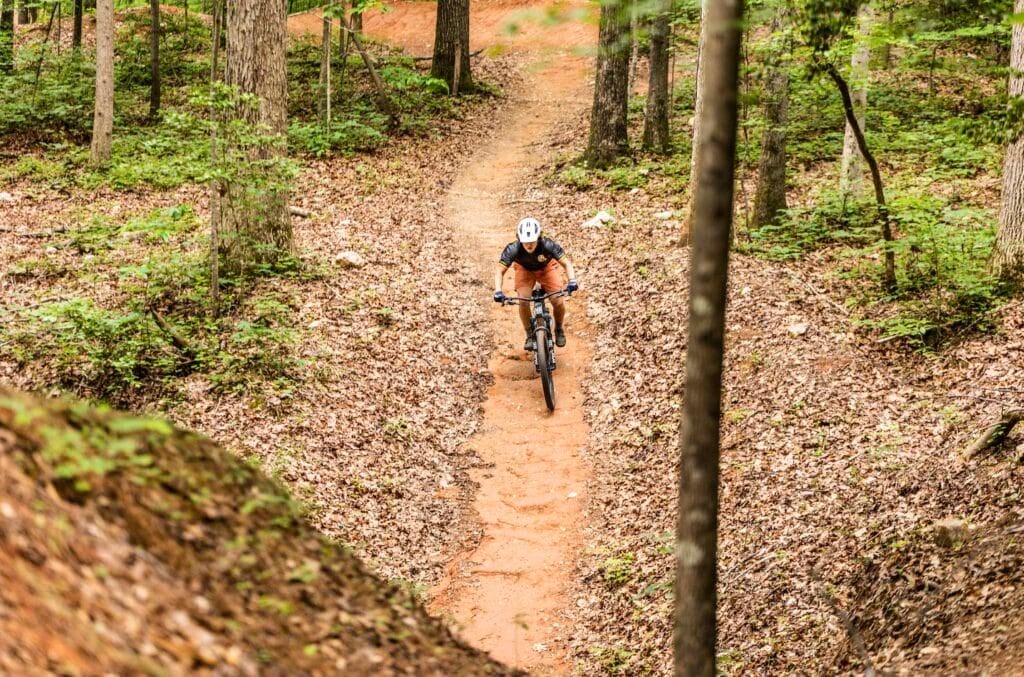
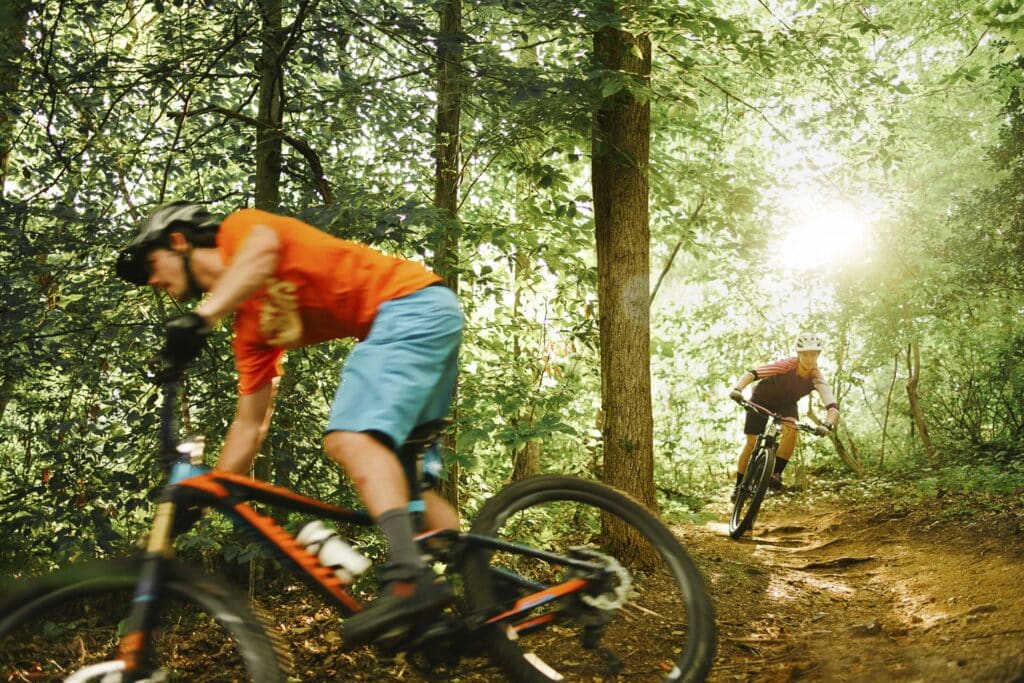
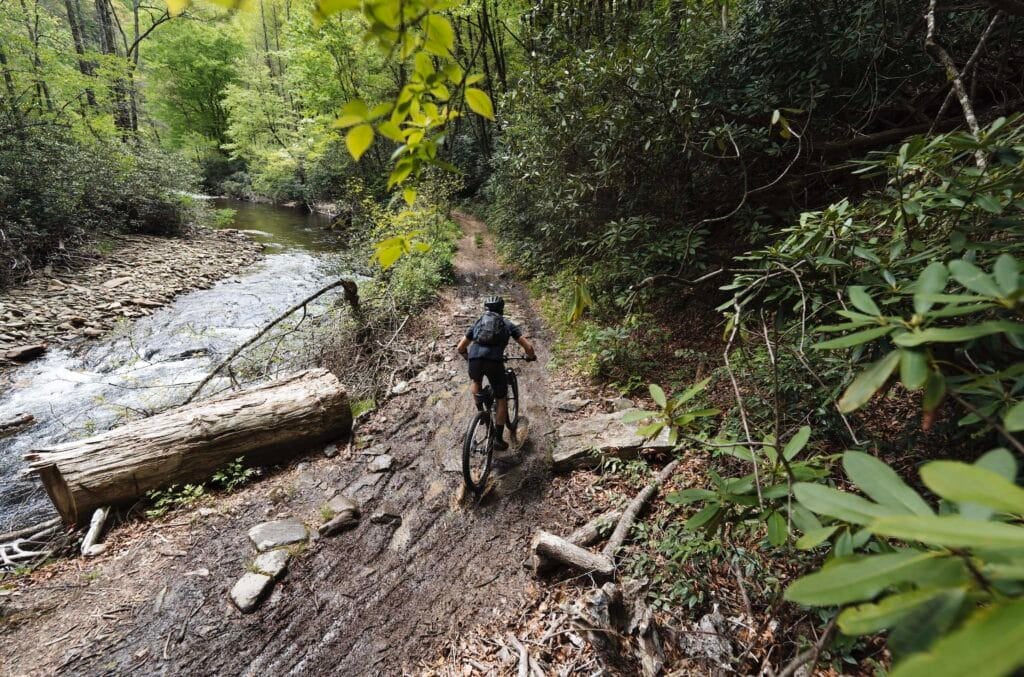
“I was a climber, tried and true. I’d never even touched a mountain bike,” she says. “But I tried it and fell in love pretty immediately. The rest is history.”
By 2019, she’d earned her certification through the Professional Mountain Bike Instructors Association and officially launched her mountain bike therapy program.
Today, her approach is rooted in polyvagal theory, which explores how the nervous system governs our reactions to threat and safety. For trauma survivors, that system can get stuck in fight, flight, or freeze. Mountain biking, Hunter says, offers a unique opportunity to break the loop.
Take a rock garden, for example. Instead of pushing clients to charge through the technical section on adrenaline alone, Hunter slows the process down.
“We stop and notice what’s happening in the body,” Hunter says. “We explore the stories they’re telling themselves and assess perceived versus actual risk.”
Clients often break the section into smaller chunks, returning to it again and again until their nervous system no longer signals danger. “When we reinforce safety,” Hunter says, “we build new neural pathways that support healing.”
For Laura Smith, a client who asked to use a pseudonym, healing began when she went over her handlebars during a ride with Hunter. It was a moment of panic—one that could have reinforced old patterns of fear and shame. Instead, it served as a turning point.
“Sara checked on me and gave me a choice: stop riding or keep going,” says Smith, who has been diagnosed with PTSD. “She trusted me to decide. That moment really shifted things for me.”
Through her work in the woods, Smith has developed tools she now uses both on and off the bike. She’s learned to assess risk rather than avoid it, for example, and to stay present in her body when panic creeps in.
For Hunter, helping clients build real, embodied resilience is the heart of her practice.
“I wish I had found mountain biking when I was younger,” Hunter says. “I lived in fear for a long time without even realizing it, just stuck in a dysregulated nervous system. If someone had helped me understand what fear feels like and how to move through it in a fun, supportive way outdoors, that could’ve changed everything.”

Fresh air fix
Healing need not require a bike helmet. Here are two slower ways to reconnect with the Earth and support your mental health in the process.
Wild Women’s Adventure Club
Morgantown, West Virginia
In the hills of Morgantown, clinical ecotherapist Adrienne Epley-Brown is redefining group therapy—one muddy hike at a time.
Her Wild Women’s Adventure Club trades fluorescent lights for forest canopies, offering outdoor-based sessions that blend emotional expression with grounding exercises, journaling, creative play, and shared reflection.
“Loneliness is an American epidemic,” Epley-Brown says. “This work creates safety for people to realize they can express emotions and grieve together in a group.”
That might mean lashing together a life-sized nest from fallen branches, making a mandala from natural materials, or hiking with a backpack full of stones, each one symbolizing a shared burden. “Nature helps you process thoughts,” Epley-Brown says. “You’re holding tangible things you’ve been disconnected from.”
Forest Bathing
Western North Carolina
Forget speed hikes and summit selfies—forest bathing is about slowing way down. This nature-based practice invites participants to unplug, quiet the mind, and reconnect with the living world around them.
“We say the forest is the therapist,” says Mattie Decker, a certified nature and forest therapy guide based in the mountains of North Carolina. “The guide opens the doors.”
Rooted in the Japanese practice of shinrin-yoku, forest bathing has been scientifically shown to lower cortisol, reduce blood pressure, and boost mental clarity. Sessions typically last two to three hours and include gentle walking, mindful observation, and guided “invitations” to engage the senses—like listening to bird calls or noticing patterns in leaves. The experience often ends with a simple tea ceremony.
“This isn’t just about relaxing in the woods, it’s about healing the broken relationship between humans and the more-than-human world,” says Decker, who leads forest therapy sessions at The North Carolina Arboretum in Asheville and offers weekly mindfulness classes at the Fairview Library. “When we remember that we are part of nature—not separate from it—something in us realigns.”

